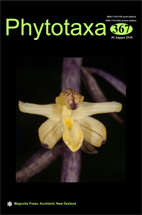Abstract
A new and unusual species of Antiphytum, here named A. geoffreyi, is described and illustrated. This new species is assigned to the genus Antiphytum because it possesses eremocarps directly attached to a pyramidal gynobase, which forms a ventral cicatrix on the eremocarp. However, it is unique within Antiphytum in having multiple inflorescence branches arising nearly at the base of the plant, a triangular-pyramidal gynobase, and the proportionally longest eremocarp cicatrix of the genus. Some of these characteristics are reminiscent of Ogastemma, the sister genus of Antiphytum, making A. geoffreyi of potential great significance in the systematics of Boraginaceae subfam. Echiochiloideae. Among species of Antiphytum, A. geoffreyi is most similar to A. peninsulare, with which it shares a triangular-shaped eremocarp, but it differs from this species in possessing an infra-medial cicatrix and a smaller corolla limb diameter. The new species is known from only two collections in Coahuila, Mexico, both made by the Hinton family, who have discovered many new species in their extensive explorations of the country and provided important specimens to the country’s flora.

